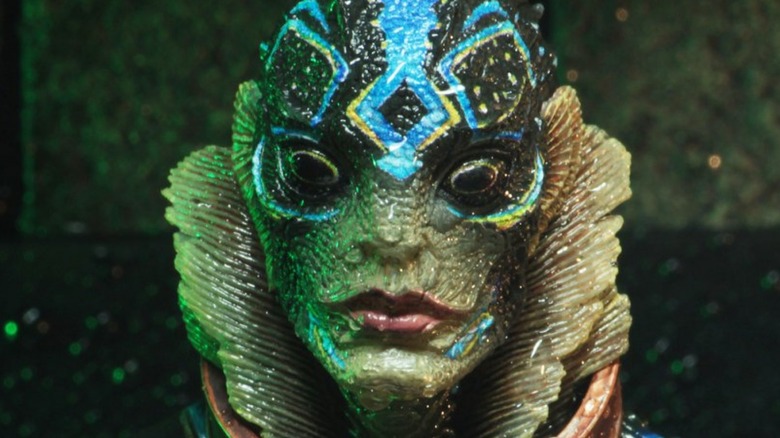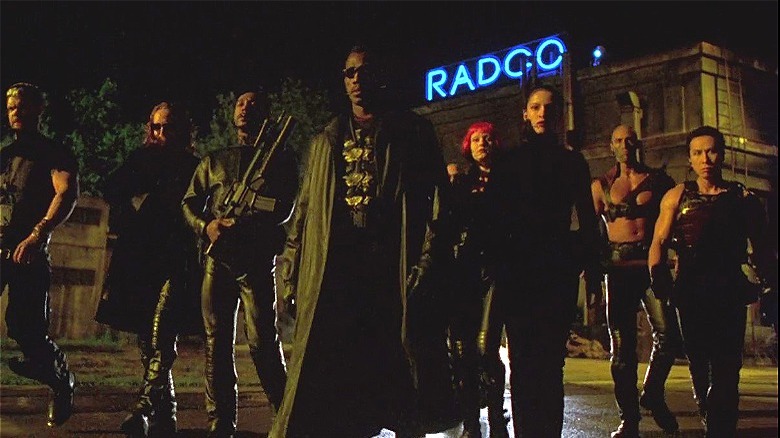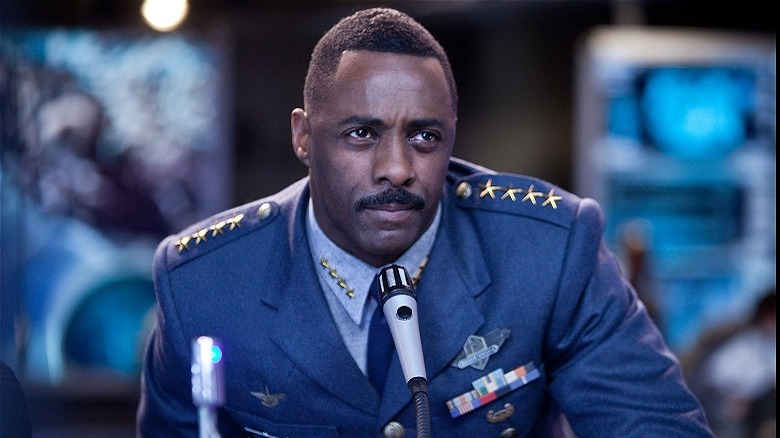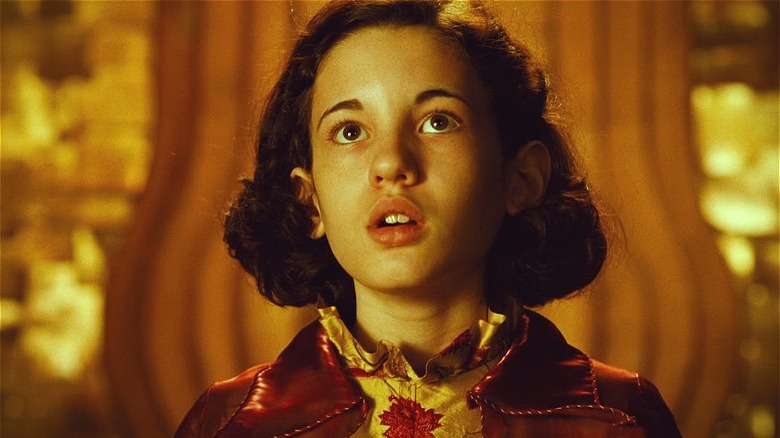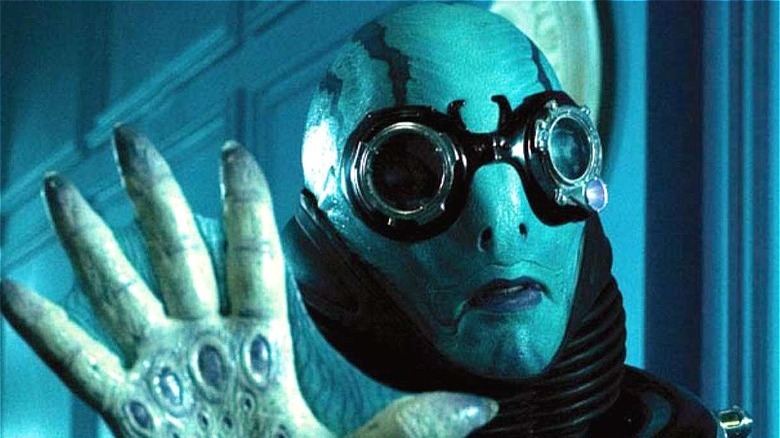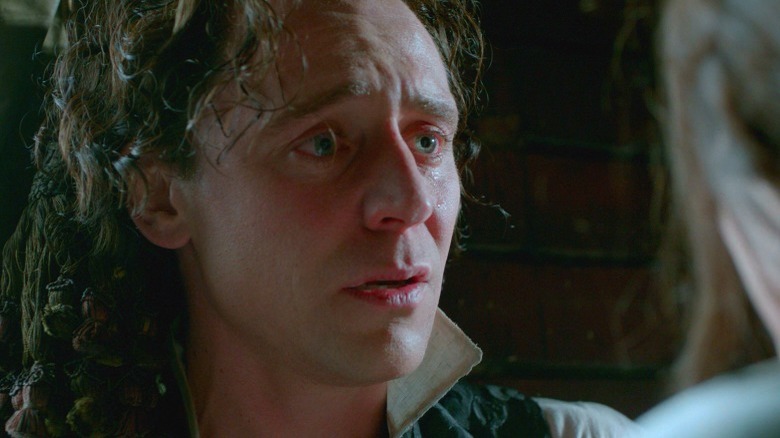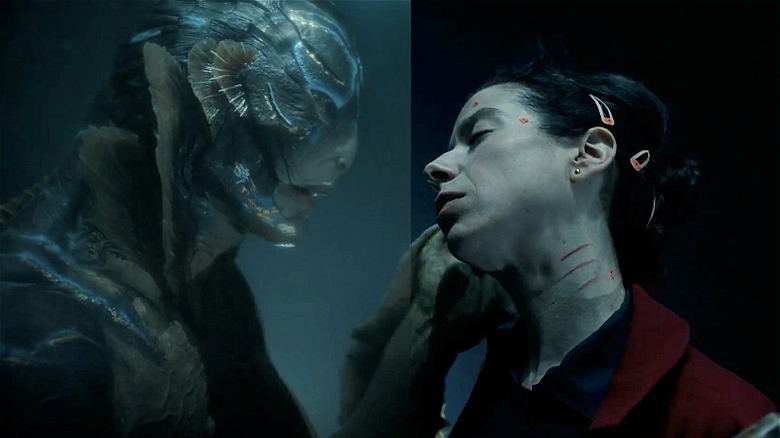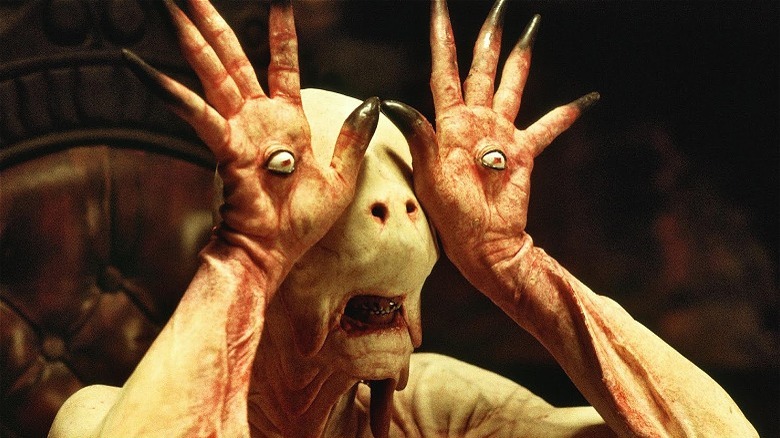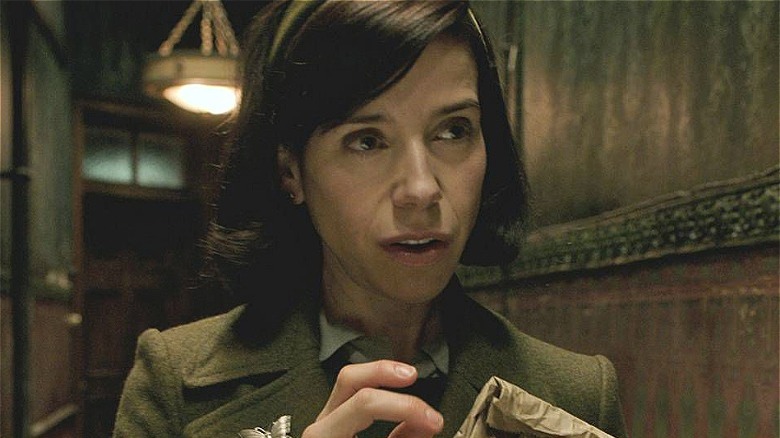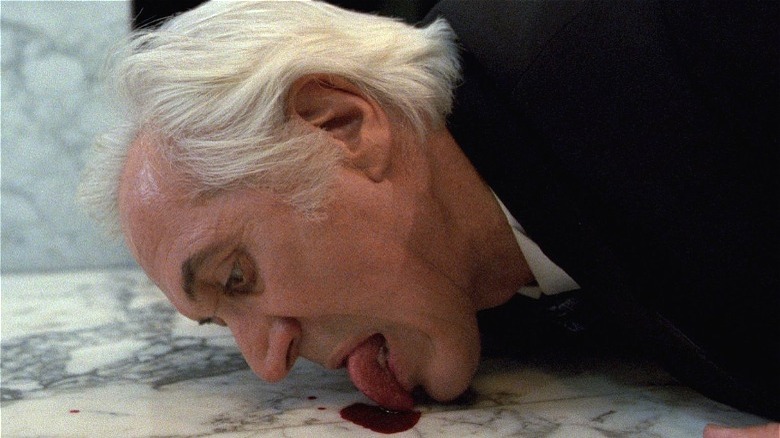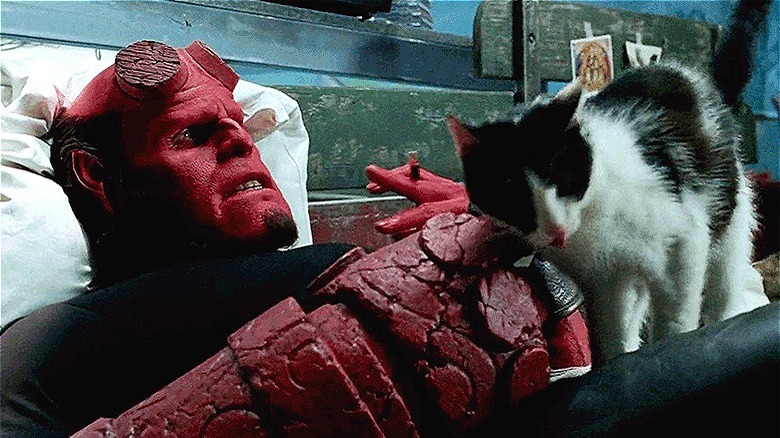The 10 Best Guillermo Del Toro Characters Ranked
Guillermo del Toro will gladly tell anyone who will listen that his movies are meant to be love letters to monsters. The Academy Award-winning director is happy to honor the rubber suited critters that light the fires of his imagination; he even turned his home, the Bleak House, into a cabinet of curiosities honoring them. But the idea of monstrosity that del Toro is obsessed with inverts H.P. Lovecraft's racist notion of "the Other." Del Toro's creatures may look or act horrific, but the director is deeply aware of the humanity and beauty they inspire.
Del Toro's antagonists are often human, or, like Prince Nuada in "Hellboy II," beautiful to look at. It's how he illuminates the evil lurking inside them and, by extension, humanity itself. By contrast, del Toro's protagonists often reflect his childhood wonder, built from his memories of going to the theater and collecting rubber Godzilla toys. They thrive in the worlds del Toro builds for them, which are uniquely built to find the beauty in horror. These characters show the best of what's inside del Toro's heart.
10. The Bloodpack
Written by "Man of Steel" scribe David S. Goyer, "Blade II" doesn't live up to the legacy set up by the original film. However, the parts that do work are pure Guillermo. Showing off glimpses of the luscious side of vampire life, "Blade II" hints at secret societies and close-knit gangs. The Bloodpack, led by Ron Perlman at his growling best, is a test run for del Toro's future Jaeger teams.
The Bloodpack is a band of vampire fighters, their interpersonal connections hinted at through their behavior. Originally gathered to hunt Blade, the Bloodpack is instead forced to work with him. Their unhappiness is expressed by Ron Perlman's gruff Reinhardt, but Snowman, played by martial arts master Donnie Yen in one of his first Western roles, balances the mood. The rest of the Pack are equally unique. Priest is a mild, hippie-like vampire. Chupa is the laconic heavy. Lighthammer's self-centered pride foreshadows his downfall, and Verlaine, his lover, is as passionate as the French Decadent poet she's named for.
The vampire clans' melancholy threatens to bog the film down, but the Bloodpack's earthier, comic book-style liveliness keeps the second act of "Blade II" moving at a breezy pace. Reinhardt is a believable, more aggressive secondary antagonist, and without him as a mirror for Blade, the Gothic tragedy of clan Damaskinos and their mutated son wouldn't have hit the mark at all. The Bloodpack's existence elevates an iffy sequel into a proper del Toro film, reminding viewers of the humanity inside even the ugliest of people.
9. Stacker Pentecost
"Pacific Rim" doesn't have a subtle plot. Big robots punch big monsters, repeat until the apocalypse is cancelled. For those of us that grew up on Saturday creature features, that's all we need. Del Toro gives us joyful nonsense in spades, but his use of color and the actors' body language adds plenty of story to his characters. Stacker Pentecost uses all of that, then offers more.
It's cheating to say Idris Elba is the cast's standout; he's Stringer Bell, for goodness' sake. Putting Elba in a movie is amplifies its coolness exponentially. He exudes ruthless efficiency when necessary, but can also be as comfortable as an LL Bean sweater. Stacker Pentecost's story is told by his crisp blue uniform, stained by his radiation-induced nosebleeds, but Elba adds another layer whenever he speaks, making it clear that Pentecost is a man barely restraining his emotions.
Stacker's control over Mako Mori at the Jaeger base isn't abusive. It's the same protection he gave her as a child, and he's afraid to stop. His fury with Beckett when touched is defensive; he's tried to keep himself at arm's reach. When Pentecost can no longer maintain that distance and returns to the front lines, he allows himself to become warm again, embracing his mortality. It's the sort of performance that a kaiju flick never needs, but the movie world is made better for it.
8. Ofelia
Classic fairy tales rely on a princess's pure heart, and "Pan's Labyrinth" has little Ofelia at the center of its terrifying fable. Ofelia's innocence outshines the grim reality around her, a necessary tool if her spirit is to survive. The Spanish Civil War rages just beyond her reach, yet its violence also lives inside her home, personified by her monstrous stepfather, Captain Vidal.
Following Ofelia in her quest to succeed at Princess Moanna's trials plays up the child's inherent goodness. Played by Ivanna Baquero, Ofelia refuses to give into the cynicism that an adult might feel when reading classic fairy tales. She still believes, even at risk to her own life, and even in the face of an adult's denial. Her resoluteness feels mature despite requiring a leap of faith, and the final turn of Ofelia's destiny — when she refuses to harm her newborn brother — ensures her own ascendancy.
Ofelia is the most optimistic character in del Toro's filmography, and as a reward del Toro gives her the ending millions of little girls dream of. It's a bittersweet victory; Ofelia sheds the blood of her mortal life, but the clues say that, for Ofelia, dreams are true. She will live on in the magical, golden realm. Ofelia is only the eighth-best del Toro character, but she's still immortal.
7. Abe Sapien
Abe Sapien's is Hellboy's Taoist counterweight, a literate amphibian with a warm heart inside his cold-blooded body. Del Toro's version of Mike Mignola's character streamlines his backstory and changes his abilities, giving him more to do to in the story. But it's Doug Jones' physical performance that makes Abe something special. Abe is inhuman, yet delicate and genteel, incapable of causing fright. David Hyde Pierce voices Abe during his first outing, but refused credit and declined to return for the sequel because he felt that Jones should get all the honor for his stellar performance.
Yes, "Hellboy II" is, in spirit, a trial run for "The Shape of Water." But Abe's bashful, romantic heart, seen as he gazes at Princess Nuala from afar, is special in its own right. The changes that give Abe new psychic powers may infuriate comic book fans, but it makes this iteration of Abe feel even more empathetic and pure.
When Abe breaks character and plunges into sappy love songs and warbling duets with his big red friend, it not only resonates with the audience. It becomes the focal point of the film: two gormless romantics, doing their best, failing, and trying again, all because they fell in love. In a world that thrives on movie machismo, Abe's human nature is refreshingly sweet.
6. Thomas Sharpe
2015's "Crimson Peak" is the perfect example of how poor marketing can ruin something beautiful. Del Toro's Gothic romance seems to play everything straight, but every twist is predicated on a subversion of those tropes. Tom Hiddleston's Thomas Sharpe embodies some of the biggest swerves on the genre's old formulas, playing a victimized, lonely waif who, until love forces him to stand up for himself, is little more than a tool. It makes him one of del Toro's best characters, and a favorite for many.
A lifetime of abuse keeps Sharpe childlike, and twisted emotional bondage puts him in thrall to his sister, Lucille. It's not accurate to say Thomas is blameless in the events that lure women to the Sharpe's ruined manor, but it's also clear that he never feels like he had a choice. Hiddleston is a master at adding emotional depth to every role he takes; Sharpe's entire life story can be read in his sad eyes.
Sharpe is technically a villain, but he also plays the role of a tragic anti-hero — a Hiddleston specialty — exhibited as the child who Thomas once was jumps to the fore to save Edith. It earns Sharpe a del Toro-style redemption: sanctified eternity, at the cost of his life.
5. The Amphibian Man
The Asset, or the Amphibian Man, is the strangest leading man Guillermo del Toro has ever created. He can't speak like humans do, his morals are noble but alien, and his motivations are inscrutable. But one detail shines like the moon: He can love. Unlike Michael Shannon's Colonel Strickland, who serves as a furious indictment of masculine toxicity, the Amphibian Man is capable of rational thought.
Of course "The Shape of Water" upends our memories of "The Creature from the Black Lagoon." Of course the movie is del Toro's tribute to the genres that made him the man he is today. But the Amphibian Man is more than that. With Doug Jones again providing an elegant, physical performance that makes him intelligible without uttering a single human word, he's romance incarnate. We impress our fantasies onto the Asset, as Elisa does, and he somehow molds himself to those expectations without changing who he really is.
When the Amphibian Man eats the neighbor's cat, it's unexpected and upsetting, but we quickly forgive him. The story makes no excuses for him, beyond the most rational. He's not human and we love him, but we must also accept and understand him. It's a complete subversion of the poisonous fantasy that we can change our troubled lovers. Accept this lonely prince of the sea as he is, or not at all.
4. The Pale Man
Del Toro's monsters are often inspired by the things he loved growing up, or the things that haunt him. In "Pan's Labyrinth," Doug Jones embodies a horror that once lived only in del Toro's mind. While many of del Toro's creatures stand out, it's the Pale Man that sticks in the mind the way none of his other monsters can, making him our number four pick.
The faun warns about threat of the Pale Man before he appears on screen, although Ofelia, hungry, doesn't heed it. She sees the creature sitting at the head of a table heaped with food, paralleling Captain Vidal in an earlier scene. Both hold immutable control over their domain, and Ofelia doesn't understand the risks that either figure represents.
The Pale Man is a child-eater, and the display of sumptuous food is his trap. While del Toro originally intended the Pale Man to serve as a critique of the failures of the Catholic Church, today this monster has extra significance. Del Toro has expanded his view of the Pale Man to include all institutional evils, many of which have pale men sitting the heads of their own overfull tables. The pale men thrive, del Toro says, and the innocent continue to pay the cost.
3. Elisa Esposito
Elisa Esposito is Ofelia all grown up. Mute but never silent, she's one half of Guillermo del Toro's most heart-felt ode to the things that shaped him. She's mature and lonely, but still in love with dreams. One of the most beautiful moments in "The Shape of Water" is a private fantasy: Ofelia dances and sings and gets to be a star, beloved by the audience of her mind's eye.
It's haunting to realize that Ofelia is one of the most singular female leads in all of movie history. Her disability becomes part of her strength, allowing her to see the amphibious man for who he is. That same disability might be part of her own fairy tale ending. But she's also a purely ordinary woman. She's an adult, working a soulless job for scraps but still clinging to her dreams.
"Jupiter Ascending" is a film that deserves another look for how it cherishes the secret, over-the-top fantasies of women, but there's a reality to Elisa's portrayal that tween and twenty-something protagonists can't touch. There's room for both; it's not an either-or proposition. However, it's still depressingly rare to see an adult woman with a fantastical love story in mainstream media. Elisa is precious and special, even more than the man she drifts into the sea with.
2. Jesús Gris
Jesús Gris, our number two pick, is an even more rare type than Elisa. The number of seniors allowed to portray heroes in horror is vanishingly small, yet Guillermo del Toro's first feature film, "Cronos," doesn't just have an elder hero. It does so with grace. Gris is allowed all the moral complexities of a freshly-turned vampire. As an aging antiques dealer, Gris can't help but be tempted by the vivacity a mysterious mechanical scarab grants him.
"Cronos" wouldn't be the only time that del Toro explored his own Catholic faith on screen. Gris wants to be a good man in service to his family and his God, but the scarab is something as dangerous as the demons that tempted Christ. To those who believe in a blessed afterlife, a seductive physical existence that never needs to end is almost like profanity. And yet, all that the scarab requires is a bloody sacrifice — just a small taste.
Gris struggles with men that want the scarab for themselves, but that's not the primary conflict. The real struggle is the war within Gris himself. For all his human flaws, Gris eventually comes out the winner. He turns down immortality and rejoins his family thanks to his faith and his love of his granddaughter. Like later del Toro films, the final scene of "Cronos" leaves the character's fate in doubt. And yet, faith suggests a clear outcome: Gris is forgiven.
1. Hellboy
An easy number one pick, Ron Perlman is one of the best character actors in the business. As del Toro's frequent collaborator, Perlman was also the director's ambassador to mainstream audiences in 2004's "Hellboy." With his take on comic book artist Mike Mignola's best-known leading man, Perlman got to return to the romantic underworld that put him on the map back in the '80s.
Hellboy's adoration of the pyrokinetic Liz is another "Beauty and the Beast" riff for Perlman, with makeup that makes sure the titular hero is never mistaken for human. The new look also grants Perlman a huggable roundness that veers from Mignola's sharp drawings. Compared to the comics, Hellboy's quirks are heightened to further soften him; he loves cats, pancakes, and the old human man who raised the demon as his own son.
Hellboy thrives in opposition to regular action heroes like John McClane. He exudes a blue-collar exhaustion with his BPRD job, yet Hellboy is still driven to do his best, not only because it makes his friends and family proud, but because it's his way of spitting on destiny. Hellboy is a good person because he fights to be one. In that way, he's one of del Toro's film theses incarnated: Faith and destiny are only tools that guide us. Who we are isn't determined by our shape, and those who we often dismiss as "other" can be loving and lovable.
